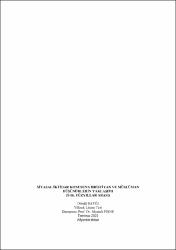Siyasal iktidar konusuna Hıristiyan ve Müslüman düşünürlerin yaklaşımı (9-16. Yüzyıllar arası)
Özet
Bir devletin en önemli unsurlarından olan siyasal iktidar, sosyal yapılar hiyerarşisinde devlete üstün bir statü sağlamakta ve toplum içerisindeki diğer sosyal yapıların siyasallaşmasında oldukça etkili olmaktadır. Kabul edilebilir bir meşruluğa sahip olması gereken siyasal iktidarın, en önemli meşruluk kaynaklarından birisi de din olgusudur. Aynı zamanda dinlerde insanlara ulaşabilmek için siyasal otoriteleri kullanmaktadır. Bu bağlamda Hristiyanlık ve İslamiyet de siyasal iktidarın otoritesinden yararlanmış ve onu etkilemiştir. Bu doğrultuda, bu çalışmanın amacı Hristiyanlık ve İslamiyet dinlerine mensup düşünürlerin siyasal iktidar konusuna yaklaşımlarını inceleyerek, bu yaklaşımlar arasındaki benzerlikleri ve farklılıkları tespit etmektir. Tezde geniş bir literatür taramasına dayalı betimleyici, nitel yöntem kullanılmıştır. Yapılan çalışma kapsamında, her iki dinin siyasal iktidar ile etkileşimlerinin en yoğun olduğu IX. ve XVI. yüzyılları arasındaki dönem incelenmiştir. Çalışmanın sonucunda Hristiyan ve Müslüman düşünürlerinin siyasal iktidar konusuna yaklaşımlarının farklı olmasında temel etken mensup oldukları din olarak gözükse de, dine bağlı olan farklı etkenlerde mevcuttur. Yaşadıkları coğrafya, içlerinde yetiştikleri siyasal yapılanmalar, yaşadıkları dönemdeki siyasal iktidarların dini kurumlar ile olan etkileşimleri, yetiştikleri bölgenin sahip olduğu bilgi birikimleri ve ekonomik durumu ve Hristiyanlık ve İslam’ın birbirleri ile olan etkileşimleri de bu farklılıkların oluşmasında önemli rol oynamıştır. Sonuç olarak, düşünürlerin siyasal iktidar konusuna yaklaşımları Hristiyan düşünürler için siyasal iktidarı savunma ya da dini iktidarı savunma şeklinde olurken, Müslüman düşünürler ise siyasal iktidarın kendisi ile ilgilenmişlerdir. The political power, which is one of the most important elements of a state, ensures a superior status to the state in the hierarchy of social structures and becomes very influential in the politicisation of other social structures in the society. One of the most important legitimacy sources of the political power that requires having acceptable legitimacy is the religion. At the same time, religions also use political authorities in order to reach people. In this regard, Christianity and Islam have benefitted from the authority of the political power and affected it. Accordingly, the aim of this study is to analyse the attitudes of the philosophers who are the followers of the religions of Christianity and Islam towards the issue of political power and to detect the similarities and differences between these attitudes. In the thesis, a descriptive qualitative method is used based on an extensive literature review. In the scope of the study, the period between 9th and 16th centuries is investigated when both religions had the highest interaction with the political power. Although it seems that the main factor in differing attitudes of the Christian and Muslim philosophers to the issue of political power is their religions as the result of the study, there are some other factors connected to religion. These factors playing crucial roles in the determined differentiations are the geography where they lived, political constructions in which they were trained, interactions of the political power with the religious institutions in the period they lived in, accumulation of knowledge and economic status in their regions, and the interactions between Christianity and Islam. Consequently, attitudes of the Christian philosophers towards the issue of political power are defending the political power or religious power, while the Muslim philosophers are interested in the political power itself.
Bağlantı
https://hdl.handle.net/11630/9554Koleksiyonlar
- Yüksek Lisans Tezleri [2074]



















